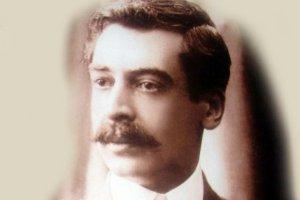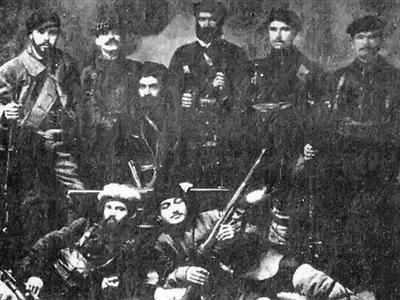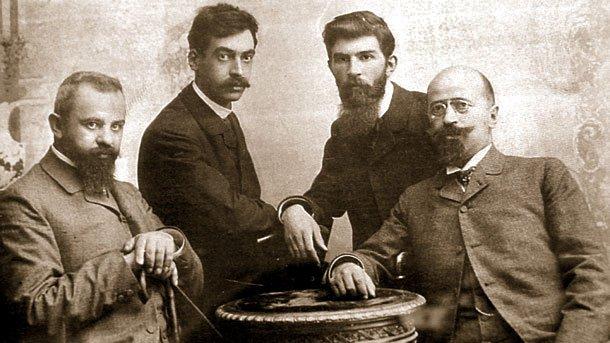
© Photo: archive
Try to imagine his start: born with the unsightly surname Kratcholov, meaning trouser, in an obscure provincial town (Chirpan); trained to become a telegrapher; dark-eyed, thick-lipped because of reported Arabic genes, far from sexy. How could this ugly duckling emerge almost overnight as the black swan of Bulgarian poetry and as its most mesmerizing womanizer?
Let us go for his other story then. Born in 1878, the year of Bulgaria’s liberation from Turkish rule, Peyo Yavorov (his penname, derived from sycamore) was in great demand as a poet destined to transform Bulgarian poetry, as a rebel dedicated to Macedonia, and as a lover by Sofia’s loveliest high society girls. In a way Yavorov followed into the steps of great Hristo Botev and cast himself as rebel in the first place.

© Photo: www.promacedonia.org
Throughout his life he was among the leaders of the Internal Macedonian Revolutionary Organization fighting for the liberation of the Bulgarian ethnic territories in the region of Macedonia that in the early 20 c. was still part of the Ottoman Empire. However, Yavorov was soon claimed by the Mysаl (Concept) Literary Circle. Its leaders, Dr. Krastev and Pencho Slaveykov, both trained in Germany and in the Nietzschean tradition, were painfully aware of the need of transformation – seen as Europeanization - of the Bulgarian literature that would remedy its apparent humanistic deficit. To quote literary historian Svetlozar Igov, “the arterial line of this cultural turning point was carried out through the replacement of old (patriotic) values with anthropocentric ones (humanistic and individualistic). In the stead of the Fatherland that used to be the ultimate value of the Ivan Vazov era and poetics, now it was the turn of Man, of the Individual to take center stage.”
* * *

© Photo: archive
The Concept Circle was desperate for a handful of really great, fresh poetic talent of a European worth, and they spotted this in young Kracholov, to whom Pencho Slaveykov generously offered the lovely penname Yavorov. This happened once the young, magnetic guy published his amazing poem Calliope, a masterpiece displaying his genius of reinventing language. But there was much more to come, as the fine-tuned soul of the poet departed from the Revival-time idyll of being part of the community and took a thorny path of intense introvert poetry sore with the tragic rift between the self and the community, between dreams and reality. The Concept Circle sent the poet on a creative trip to France where he mastered his skill by reading a lot of French poetry. This paid back soon, as Yavorov’s works boasted supreme European quality and turned him into the pioneer of the Bulgarian symbolism.
* * *
Yavorov’s poetic works and two celebrated plays, his romantic prose, are all dense with drama, as well as his stormy private life. His countless love affairs nurtured inflated rumors, and the dark poet and rebel was soon the hot news for a few gorgeous girls from Sofia’s high society. Unfortunately one of his great loves, Mina Todorova, an angelic teenager, died of tuberculosis in Paris.

© Photo: archive
Peyo Yavorov was broke, but his search for love continued. With new hopes he started an affair with the beautiful and brilliant Laura Karavelov, daughter of leading politician Petko Karavelov. The two married in 1912. The couple was the talk of the town, but soon, Laura started to suffer from jealousy, as her celebrity husband indulged into a few flirtations. His perfect match, this extraordinary woman was so much in love and desperate to keep him to herself, that on a dark November night of 1913 she shot herself and died. Absolutely devastated, the poet followed into her steps, fired a gun at his temple, but failed to kill himself. He was left blind, all alone with the impossible burden of the vocal public verdict of being the moral killer of lovely and loving Laura.
One of the greatest talents in Bulgarian poetry had lost the meaning of his life and went on to kill himself, this time quite effectively. In 1914 he shot himself but had also taken a large dose of strong poison, just in case. That was the tragic and early end of Peyo Kratcholov Yavorov, a fine poet of European caliber. Svetlozar Igov defines him as “the poet of the most strenuous spiritual dulaity and private anguish in Bulgarian culture – of the alienation of the spirit from the flesh, of earth from heaven, of man from man, of man from his own self.”
* * *
Two Souls
I do not live: I burn. In acrimony raging
Two souls are dueling within my breast:
The soul of a devil, the soul of an angel.
Their breathing is flame and it gives me no rest.
Not one flame bursts but two – whatever I am touching,
And in each stone two heartbeats I hear clash…
Wherever I go there is an odious doubling
Of two warring faces, which vanish in ash.
And everywhere the wind that follows me is spreading
The ashes: all my footprints are effaced.
For I am not living – I burn! – and am shedding
A trail of grey ashes across a dim waste.
Translation by Peter Tempest
* * *
To end this piece from the series Intense Literature on great Peyo Yavorov, we bring you an apt quotation by another renowned Bulgarian poet, Atanas Daltchev: „Yavorov injected into the Bulgarian literature the infinite disquiet of ‘universal issues’, the deadlocked circle of anguish, the ghost of death that turns living into a horror, and even the worse horror that comes with the awareness that one can never and nowhere be alone, the theme of duality.”
A young Bulgarian artist decided to leave this world in the middle of the past century in order to preserve his incorruptibility, even though he was defeated by the system on a purely physical level. Currently, in the gallery of the..
Musical, culinary, folklore events… the event program in Bulgaria is saturated, so much so that experts are already talking about how the alarmingly growing number of new festivals should be limited. "A clear strategy is needed: which existing..
Bulgarian society knows very little about the Bulgarian emigrants to Argentina. The curious story of the path of our compatriots to the South American country and the threads by which they are connected to their ethnic roots thousands..
Iranian film director Mohammad Rasoulof has received the special award of the international film critics FIPRESCI Platinum at the Sofia Film Festival ...
Bulgarian society knows very little about the Bulgarian emigrants to Argentina. The curious story of the path of our compatriots to the..
A photo exhibition to mark the 96th anniversary of the beginning of organised speleology in Bulgaria will be opened today on the Lovers' Bridge near the..

+359 2 9336 661
